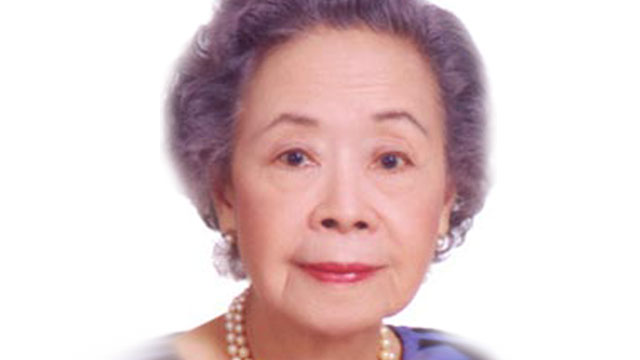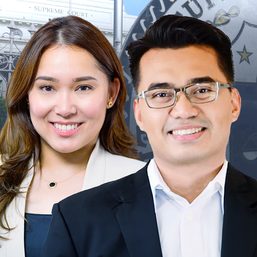SUMMARY
This is AI generated summarization, which may have errors. For context, always refer to the full article.
I can name one justice who could have been the best candidate for chief justice. She could have been the first female chief justice of the Supreme Court of the Philippines and of the world, had not the vagaries of fate been unkind. Unfortunately, she has long retired and I can only regret that she can no longer be in the running.
I am referring to Justice Ameurfina Melencio Herrera, the chairman emeritus of the Philippine Judicial Academy.

I began my career as a lawyer in 1989 at the Supreme Court, straight out of law school and a month after passing the Bar. As judicial staff head of Justice Herrera, I was privileged to witness and be part of the day-to-day operations of the highest Court of the land. This was the Court of Chief Justice Marcelo Fernan made up of Justices Narvasa, Padilla, Paras, Gutierrez, Feliciano, Grino-Aquino, Cortes, Sarmiento, Regalado, Bidin, Medialdea, Gancayco, and the most junior justice then was Hilario Davide who would later become Chief Justice.
This was the time when the Supreme Court was tagged as the “jewel” of then President Cory Aquino, the time when the Court was at its most credible having exhibited an independence which was more admired than criticized.
Having clerked for someone like Justice Herrera, I cannot help but derive my criteria for the position of chief justice with her as my benchmark. She graduated from the U.P. College of Law as valedictorian, cum laude of Class ‘47. She topped the bar exams that same year.
A premium should be placed on one’s performance in law school and the bar exams as well. While these do not guarantee one’s performance as chief justice, having exceptional academic qualifications certainly puts the candidate in a cut above the rest. These qualifications could serve as a gauge of one’s knowledge of the law and as well as the possession of the basic skills required in oral and written communication.
Justice Herrera practiced law for many years before she was appointed Regional Court Judge and later on Justice of the Court of Appeals. A candidate who has either practiced law or who has had experience sitting as a judge in Court would be better off than someone who has not practiced law at all. A candidate who possesses this criterion would necessarily have a wider perspective in terms of understanding legal processes and the many administrative problems that besiege the judiciary.
Unsullied reputation
The most important criterion – if there is anything that has set Justice Herrera apart from mortals like us – is her unsullied reputation as the epitome of industry and integrity. A justice of the Supreme Court should be painstakingly assiduous in seeing to it that work is done. He or she should have a passion for work and a determination to perform the task effectively and promptly. There should be results.
I always recall with amusement and awe how Justice Herrera would continue reading documents and various papers even while she was on the road. There was a folding tray that was a permanent fixture in her car along with a box of pencils and markers.
Whenever we would ride together, we would both go over her drafts. She penned each and every decision attributed to her name. While we in her staff would prepare a draft, this would only serve as an outline of the facts and the applicable law. The drafts would come back to us with all her revisions in her own handwriting. She would go through each and every volume of the SCRA to check if our citations were correct.
At a time when the computer had just emerged, she was open-minded enough to explore its capabilities if only to complement her desire to get work done. I remember that we had to put all her cases in a database using FoxBASE in order that we will be able to monitor the progress of her case disposition. She hastened to learn how to use the computer so she could type her decisions herself.
The future chief justice must not only have a passion for work. He must also possess an innovative spirit, open to explore all possibilities to improve case management and disposition.
Testing integrity
Then of course, integrity. I believe that this is the most difficult to ascertain. How does one know in absolute terms whether a candidate has it? It is something one does not write in one’s biodata. Any person who would do so would cause the reader to suspect that that it is not the case.
Integrity is “what someone does when no one is looking.” This is where public perception comes in. One’s reputation for honesty and integrity is a judgment made by others based on certain acts. My prototype, Justice Herrera, was widely known to possess this virtue as history will tell.
She had a reputation for being very strict. She was media-shy and was not inclined to be interviewed. Yet she was well-loved by the employees of the Court. They knew her to be a no- nonsense jurist but one that they could approach if problems arose. Despite her stern demeanour, she was able to inspire all of us who worked at the Court. Everyone felt that it was a privilege to have worked with her.
These are the leadership qualities which I believe a future chief justice should have. The ability to inspire others — the employees of the Court and his colleagues most especially — to be the best that they can be. He or she must be able to unite everyone towards working for the common good, not only of the Court but of the country as well.
In truth, we can never really know the secrets of men’s hearts. At best, choosing a chief justice is a leap of faith.
Whether he or she would be a good chief justice can only be a probability at the outset. It is only after the trials come, or the when the battle is won or lost, that there will emerge a good or a bad chief justice. – Rappler.com
(The author is president of the U.P. Women Lawyers Circle. These are excerpts from a talk she delivered before the Integrated Bar of the Philippines forum, “The Search for the Next CJ: Defining the Best Candidate for the Job,” on 16 July 2012.)
Click on the links below for more.
- 22 official candidates for Chief Justice
- JBC to interview CJ candidates starting July 24
- 25 accept nominations for chief justice
- Questions for chief justice candidates
- JBC should review process of choosing CJ
- Besides JBC, Palace has judicial search committee
- CONVERSATIONS: How should the JBC choose the next chief justice? #SCWatch
Add a comment
How does this make you feel?





There are no comments yet. Add your comment to start the conversation.